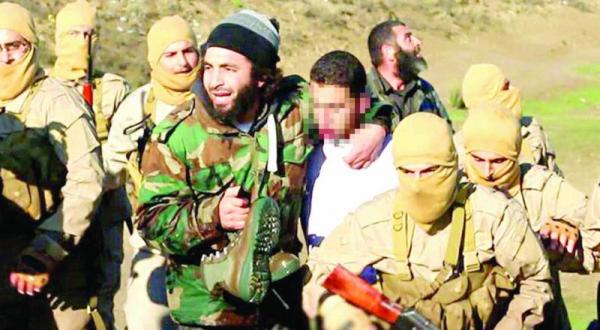In Arab politics, it’s all backstabbing and no backbone
Wednesday, 31 December 2014
Chris Doyle/Al Arabiya
In the Middle East right now, the wise do not dare to predict. Who back in 2010 came even close to foreseeing where the region is today? In four years the mood pendulum has swung violently from resigned helplessness, to over-hyped frenetic optimism to rank despair. As 2014 exits in ignominy, the Middle East lottery is in full swing as to which country, area or people are hit next by the latest round of conflict and brutal violence. There are to my mind five standout features in 2014 that need to be addressed over the coming year.
The first stand out feature was clearly the move of ISIS to the center stage with its self-proclaimed statehood and ruthless acquisition of territory in both Iraq and Syria. Its success not least in recruiting over 15,000 foreign fighters from 80 countries makes al-Qaeda seem so very 20th century.
But rapid success can also lead to rapid failure. The ISIS bandwagon has nearly run aground and its support may be flat lining. The initial surge replaced by more somber assessment of what is probable. Cities and towns under its control get only a few hours of electricity and limited clean water. Is the stardust wearing off as some fighters are reportedly trying to abandon the ISIS juggernaut? Yet ISIS is a symbol of international and regional failure, an abiding desire of so many especially the young to change the existing order.
The second feature is the continued lack of regional leadership and continued bickering. There is a lot of backstabbing but no backbone.
Throes of chaos
Even with four Arab states in the throes of chaos – Syria, Iraq, Libya and Yemen; with Israel hammering Gaza and colonizing the West Bank; with Jordan and Lebanon engulfed by the fallout; there has not been one coherent Arab peace plan. Israel, Turkey and Iran still look the players most able to define the agenda even though they too like their Arab counterparts, declining influence and status internationally.
Inter-Arab rivalries are, if anything, worse and often bitter and personal. Even supposed allies back rival groups and present differing plans to resolve Syria. It took the success of ISIS to scare regional powers that had backed rival Islamist fighters in Syria and Iraq into limited action. Yet for some, there is still the expectation that the United States has to do all the heavy lifting. Nobody in the region is overwhelmed by the Arab participation in the anti-ISIS coalition. Where are the Arab boots on the ground?
“The recipe for a rejuvenated region will be complicated and tough but 2015 must see a solutions surge”
Chris Doyle
The third feature is the continued lack of international strategy and leadership. Yet at least in 2014 diplomacy was given a fleeting chance with active attempts on Syria, Palestine and Iran whereas in 2013 there was none. The Ukraine crisis and the Russian occupation of the Crimea smashed any residual chance of a common Syrian strategy. Whilst the West demands an end to that occupation it does not have the guts to demand the end of the Israeli occupation of Palestine. Here occupation is just routine, normal. Palestinians are left to celebrate the limited symbolic victories of various European Parliaments calling for recognition of a state still under occupation, blockade and colonization. The Iran talks look the most promising but the Republican-dominated Congress in 2015 is in no mood to let Obama crown his presidency with an historic legacy-saving deal. Cuba may have to suffice.
Fourthly, the entire regional order is close to being dismantled in the worst case scenario atomized into power groups and territory based on ethnicity and sect. Diversity is seen as a weakness not a strength with minorities paying the heaviest of prices, notably the Yazidis. Christians are being driven out of the lands of their birth where the world’s earliest churches will either be rubble or museums. ISIS is fashioning a Sunni Muslim state, whilst Israeli politicians insist Israel be a “Jewish state.” The Kurds are ever more convinced that independence is their only option.
The fifth and perhaps most heartbreaking feature of 2014 is that all the above failures have shattered millions and millions of innocent lives. The grimmest statistic of 2014 is that over 13 million Syrians and Iraqis have been displaced. I dare anyone to guess how much larger this damning figure will get. The implications are huge. The richer states are largely not opening their doors. Britain has a shameful record of taking just a busload of vulnerable Syrian refugees. As a result the Mediterranean has become the deadliest sea route in the world according to the U.N. with 207,000 people (three times the previous record) trying to cross its treacherous waters into Europe with almost 3,500 having perished.
International donors can no longer fund the massive U.N. aid programs and tend to pledge to causes that attract media attention. Palestinians in Gaza barely get a mention no so can one be surprised that a mere two percent of the $5.4 billion pledged for the reconstruction of Gaza has so far been delivered.
The recipe for a rejuvenated region will be complicated and tough but 2015 must see a solutions surge. The region needs strong, energetic positive leadership, a clarity and unity of purpose amongst the leading players and international backing to bring these conflicts to a close. Only then can Middle East soothsayers and forecasters crawl out of the woodwork and ply their trade. The region needs some boring predictability.



















